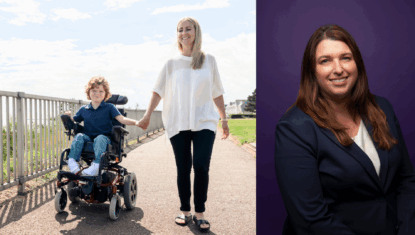Dr. Sherri Katz attended medical school at McGill University in Montreal from 1992 to 1997. She completed her residency training in pediatrics, as well as fellowship training in pediatric respirology and pediatric sleep medicine at the Hospital for Sick Children in Toronto in 2003. Dr. Katz completed a Master’s of Science and the Clinician-Investigator Program of the Royal College of Physicians and Surgeons of Ontario at the University of Toronto in 2006. She joined the Children’s Hospital of Eastern Ontario (CHEO) in 2003. Dr. Katz is the Division Chief of Pediatric Respirology at CHEO and a Senior Scientist at the CHEO Research Institute. She is a Full Professor of Medicine at the University of Ottawa and holds a cross-appointment at the School of Epidemiology and Public Health. Her clinical interests include complex respiratory care, sleep-disordered breathing, respiratory aspects of neuromuscular disease, and technology-dependent children. She is the principal investigator of research studies evaluating 1) the use of assistive respiratory technologies for children with chronic diseases, particularly neuromuscular disease and obesity, 2) evaluating novel diagnostic modalities for pediatric sleep-disordered breathing and 3) use of pulmonary MRI to predict clinical outcomes in children born extremely preterm.
Related News
Research Projects
-
Impacting the physical activity confidence of children with medical conditions or disabilities: A randomized controlled trial
27/03/2025
Youth with medical conditions or disabilities (MCD) seldom achieve healthy physical activity recommendations. Barriers include a perceived lack of competence, fear of pain/symptom exacerbation, or physical function changes. A 12-week intervention targeting physical activity confidence was evaluated among youth with MCD. The study found that youth who were confident were more likely to engage in physical activity. The in-person intervention increased participants’ activity confidence. The limited impact of the virtual format suggests that implementing new skills with peers is critically important for enhancing activity confidence. Further research is required to evaluate whether confidence gains could be sustained beyond the study intervention, would longitudinally increase activity participation over time, or would transfer to other activity settings.
-
Understanding the Physical Literacy Development of 8- to 12-year-old Children Living with Chronic Medical Conditions: A Comprehensive, Mixed Methods Inquiry
01/09/2024
Physical literacy is a concept used to describe the combined physical, affective and cognitive capacities facilitating an active lifestyle. Physical activity participation is essential for children living with chronic medical conditions, but knowledge of physical literacy among this group is scarce. An explanatory, sequential mixed methods design was used to comprehensively describe the physical literacies of children with chronic medical conditions (CMCs). Children with CMCs can achieve recommended levels of physical literacy without meeting normative standards for physical competence. Participants would benefit from a physical literacy intervention that targets the development of bodily self-regulation skills and risk evaluation in active settings.
-
Quick, effective screening tasks identify children with medical conditions or disabilities needing physical literacy support.
03/01/2024
Activity adequacy, alone or with screen time, most effectively identified children likely to benefit from physical literacy support. Adequacy and screen time questionnaires are suitable for clinical use. Similar results regardless of diagnosis suggest physical competence deficits are not primary determinants of active lifestyles. Research to enhance screening specificity is required.
-
Sleep quality, physical activity, screen time, and substance use in children with obesity: associations with obstructive sleep apnea
01/03/2023
In children with obesity, more substance-use behaviors were independently associated with greater OSA severity. As there are complex, bidirectional relationships between lifestyle behaviors and OSA severity, interventions need to be comprehensive and multifactorial to ensure successful treatment of OSA and its sequelae in children.
-
Characterization of physical literacy in children with chronic medical conditions compared with healthy controls: a cross-sectional study
09/03/2021
Physical competence (motor skill, fitness) interventions, rather than motivation or education, are needed for these youth.




